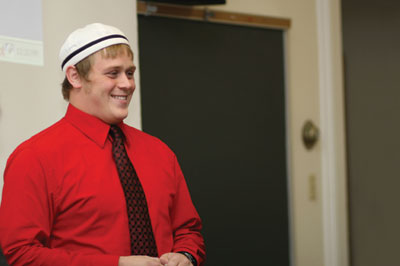 Justin Gardiner spent 50 hours last spring with an overseas child development program observing Danish kindergarten children as part of his preparation to become a high school teacher and coach. He remembers how laid back and unstructured the class was, likening it to an American Montessori program.
Justin Gardiner spent 50 hours last spring with an overseas child development program observing Danish kindergarten children as part of his preparation to become a high school teacher and coach. He remembers how laid back and unstructured the class was, likening it to an American Montessori program.
"It was cool to watch the kids playing, running around outside, climbing trees, even fighting," the teacher education student recalls. "They formed their own groups, played games, set rules, and solved problems. It was amazing to see the creativity develop in them. It was so unstructured, but yet there was a discipline to it."
About the same time he was corresponding with several of his senior football teammates, who were similarly trying to set up a disciplined, yet unstructured summer—one that would prepare them for a 2007 season of great promise.
Knowing that his teammates were sweating out 6 a.m. training workouts throughout the spring, Gardiner tried to stay in shape in Copenhagen. But he longed to be horsing around with his friends and football brothers, just like the Danish kindergartners he was observing. He became determined to land a summer internship on campus so that he could spend time with fellow senior defensive standouts Adi Pynenberg and Andy Deig.
Then he found online the Krache Fund for undergraduate research related to military history. He didn’t know exactly what he was signing up for, but as a history major he figured it couldn’t be that bad. He had no idea that the internship would become a life-changing experience.
Gardiner’s Krache Fund internship with Wabash archivist Beth Swift focused on the papers of Illinois Governor and later Senator Richard Yates, a Civil War-era Whig-turned-Republican.
Winfred A. Harbison ’24, Wabash graduate and professor at Wayne State University, had collected the rare documents and had begun to write Yates’ biography when he fell ill and died. His son, Stanley Harbison, gave the complete collection to Wabash. The papers sat in the College Archives—largely unexamined—until Gardiner’s summer internship.
"I had no idea of the magnitude of the work until I walked into the Archives that first day," he recalls. "That work would become the most pivotal academic experience of my whole life. It’s affected every aspect of my Wabash career."
As a historian and aspiring high school teacher, Gardiner was like a kid in a candy shop as he cracked open envelopes that contained letters Yates had sent to his friend in Washington, Abraham Lincoln. He also researched documents related to the Andrew Johnson impeachment trial, Reconstruction, and Yates’ personal battles with alcoholism.
The opportunity for an undergraduate history major to source and catalog such important documents is about as rare as the pristine documents themselves. His appreciation for original source material came from his mentors in the history department.
"When I first came to Wabash, I wanted to do business, so I was looking at majoring in rhetoric or economics," says Gardiner, whose hometown’s name (Monticello, IN) has an historical ring of its own. "Just before my sophomore year, I started helping out with my high school football program, and I knew then that I wanted to do something that would allow me to interact with people. Teaching and coaching felt like a perfect fit."
His early classroom experiences with professors Rick Warner and Michelle Rhoades reinforced the kindling desire. They taught him much about effective writing and how to look at information in a different light, Gardiner says.
"Here at Wabash, you have the opportunity to really analyze the texts and have heated arguments about topics, which just sharpens your critical thinking skills. And I learned from Dr. Rhoades that it’s okay to be critical of an historian if you can support your argument with source materials."
The Harbison Collection allowed Gar-diner to do exactly that—to refute what other historians had written about Yates.
Swift’s encouragement of Gardiner drove his work.
"She’s not only one of the nicest people I’ve ever met, her enthusiasm spreads to everything she does," he says. "She taught me important archival skills, but like my coaches, she never let me do anything halfway; she was a great influence for me."
Gardiner spent the fall semester harassing opposing running backs and quarterbacks on Wabash’s 11-2 conference championship football team. He also spent a fair amount of time wowing audiences with presentations of his research of Richard Yates. One of his lectures was featured during Founders’ Week, which commemorated Wabash’s 175th anniversary. With every presentation, Gardiner’s confidence grew and his style as a teacher began to emerge.
He still has one semester remaining to finish up his student teaching to become certified, but he hopes that his experiences wallowing in Wabash’s archives, analyzing historical documents, and refuting the work of fellow historians will pay off.
Asked if he felt honored to be among the first persons to unpack nearly 150-year-old documents, Gardiner seems to know the significance on a personal level.
"Conducting that research gave me a true appreciation for what I’m studying at Wabash and made me certain that I not only chose the right major but the right career path."